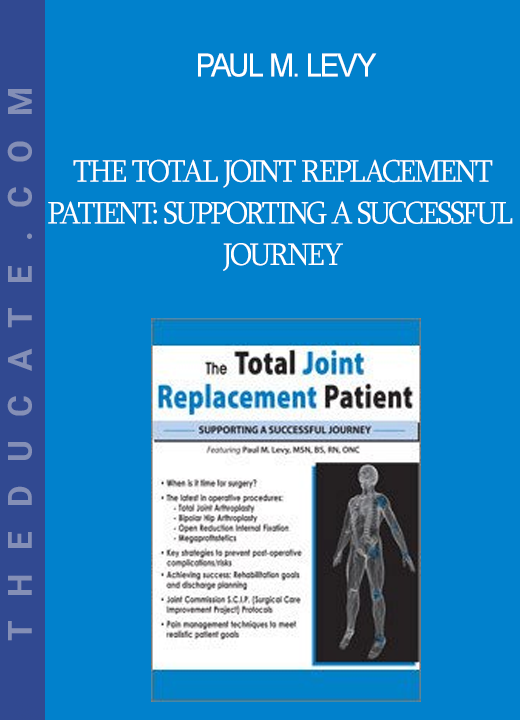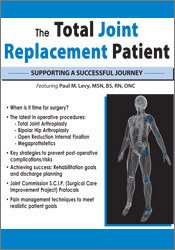Description
Paul M. Levy – The Total Joint Replacement Patient: Supporting a Successful Journey
- Faculty:
- Paul M. Levy
- Duration:
- Full Day
- Format:
- Audio and Video
- Copyright:
- Oct 05, 2016
Description
- When is it time for surgery?
- The latest in operative procedures:
- Total Joint Arthroplasty
- Bipolar Hip Arthroplasty
- Open Reduction Internal Fixation
- Megaprothstetics
- Key strategies to prevent post-operative complications/risks
- Achieving success: Rehabilitation goals and discharge planning
- Joint Commission S.C.I.P. (Surgical Care Improvement Project) Protocols
- Pain management techniques to meet realistic patient goals
Joint replacement surgeries have become common place – over a million performed per year. Paul M. Levy, MSN, BS, RN, ONC is excited to share his expertise in orthopedics to provide a better understanding of Total Joint Replacement Surgery:
- Pre-operative diagnosis: When is it time for surgery? Alternative treatments?
- Multiple joint replacements & the implications of each
- The key to preventing post-operative complications/risks
- All the options: Megaprosthetic replacements, fixations, joint revisions…
- Achieving success: Rehabilitation goals and discharge planning
Recent changes to CMS reimbursement (Value Based Purchasing or VBP) processes have put a premium on ensuring patient satisfaction is achieved. Failure to meet baseline measurements in HCAHPS scores will result in decreased reimbursements for hospitals. In addition, 30-day readmission rates also will affect VBP scores. This recording will provide strategies to address the following areas that can impact VBP:
- Co-morbidity – discussion of medical management of preexisting conditions
- Pain Management – setting and meeting realistic pain management goals
- Communication – focus on patient education and follow-up care
- Readmission – focus on tools to reduce infection and post-operative complications
This recording will leave with you a clear understanding of the entire process from start to finish for total joint patients. This will in turn allow interdisciplinary healthcare professionals to help their patients better understand the process, have realistic expectations, and improved satisfaction following surgical interventions.
Handouts
| Webcast Manual (11.52 MB) | 75 Pages | Available after Purchase |
Outline
Pre-operative Work-up
- The pre-operative work-up is a vitally important part of the operative process. Not all patients with arthritis require surgery. Knowing the treatment options allows patients to make informed decisions about their care. Radiology examples will be included for case study discussion.
Diagnosis
- Osteoarthritis
- Bone Cancers
- Recurrent Infections
- Acute Injury, Falls, i.e.
Treatment Options
- Exercise / Physical Therapy
- Injections
- Operative Treatments
Pre-operative Planning
- Understanding the processes that need to take place prior to the surgery will help the patient better prepare for the surgery, allow for less patient anxiety and establish realistic goals and expectations.
- Pre-operative Testing
- Pre-operative Clearances
- Medical
- Cardiac
- Pulmonary
- Other/Individualized
- Obtaining Consent
- Pre-operative Education
- One-to-one education
- Online education
- Pre-operative joint classes
Surgical Procedures
- Fixation
- Treatment for fractures that do not require joint replacement
- Total Joint Replacement
- Hip
- Knee
- Shoulder
- Other Joints
- The elbow, wrist, and ankle can also be replaced, but these surgeries are performed far less frequently. As well, there is currently a disk replacement surgery in study, but it is not yet FDA approved.
- Megaprosthetic Replacements
- Replacement of both the joint and a portion of the surrounding bone
- Joint Revisions
Immediate Post-Operative Care
- Multi-modal Pain Management
- Oral vs. IV
- Nerve blocks
- Ambulation
- IV acetaminophen / NSAIDs
- Intra-operative steroid injection
- Age-related analgesia
- Opioid tolerance
- Physical and Occupational Therapy
- Positioning
- Movement restrictions
- Exercises
- Assistive devices
- Wound Care / Infection Prevention
- Dressings
- Antibiotics
- VTE Prophylaxis
- Mechanical
- Pharmaceutical
- Joint Commission S.C.I.P. (Surgical Care Improvement Project) Protocols
- Surgical/Medical Complications
Post-acute Care and Follow-up
- Discharge Planning
- Acute Rehab / Skilled Nursing / Home
- Follow-up appointments
- Home medications
- Readmission/complications
Faculty
Paul M. Levy, MSN, BS, RN, ONC Related seminars and products: 2
PAUL M. LEVY, MSN, BS, RN, ONC, is a Registered Nurse with certification in Orthopaedic Nursing. Throughout his career, he has specialized in Orthopedics, specifically Total Joint Replacement Surgery, Sports Medicine, and Musculokeletal Oncology. Paul has worked on post-operative orthopedic units, serving as a staff nurse, charge nurse, preceptor, and mentor.
In Paul’s current role as Clinical Education Specialist for Orthopedics and Emergency Medicine at a hospital in Pittsburgh, PA, he is responsible for staff development and training, coordinates the Geriatric Fracture Program and the Crisis Management Training. In addition to his years of training experienced orthopedic staff, Paul has also developed an “Ortho for Non-ortho Nurses” program to help resource pool, staff, and new orthopedic nurses better understand orthopedic care. He also developed an Orthopedic Reference Guide for nurses to assist staff when orthopedic patients are admitted “off-service.”
Paul is committed to his area of expertise. He has spoken at the National Association of Orthopaedic Nurses Annual Congress, and other national and local conferences focusing on a variety of orthopedicrelated topics, and currently serves as the Chapter President of the Pittsburgh Chapter of the National Association of Orthopaedic Nurses.
Financial: Paul Levy has an employment relationship with UPMD St. Margaret. He receives a speaking honorarium from PESI, Inc.
Nonfinancial: Paul Levy is a member of the National Association of Orthopaedic Nurses. He is Chapter President for the Pittsburgh Chapter of the National Association of Orthopaedic Nurses. Mr. Levy indicates that he has a bias as an opponent of single payer healthcare delivery.







Reviews
There are no reviews yet.